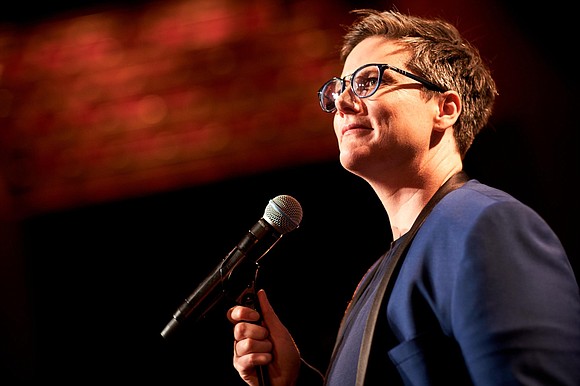Hannah Gadsby and Jerry Seinfeld bring very different comedy philosophies to Netflix
CNN/Stylemagazine.com Newswire | 7/2/2018, 10:13 a.m.
By Brian Lowry, CNN
(CNN) -- Netflix has followed in HBO's footsteps by investing heavily in stand-up comedy. And as a sign of what a big tent that discipline represents, one would be hard-pressed to find a more striking philosophical split than Jerry Seinfeld -- who's back with his breezy series "Comedian in Cars Getting Coffee" -- and Hannah Gadsby, whose scathing one-woman show questions the very nature of the stand-up craft.
In an intriguing juxtaposition, both Seinfeld and Gadsby have cited Bill Cosby atop their list of inspirations. But while Seinfeld has publicly wrestled with how to process admiring Cosby's early work with his conviction on sexual-assault charges -- asking Stephen Colbert (prior to the verdict) last September, "Should the comedic work stand on its own separate from the criminality?" -- Gadsby powerfully rejects cleaving the art from the artist in her special, "Hannah Gadsby: Nanette," rattling off a host of controversial figures who she then proceeds to write off forever.
Seinfeld, clearly, harbors a fondness of comedy's past, and revels in the freedom to kibitz with fellow practitioners. In the latest batch of "Comedians" episodes, he hangs out with Jerry Lewis in an episode taped prior to the prickly star's death last year, Dave Chappelle and Alec Baldwin, among others.
"Do you ever think about your own relevancy? I don't either," Chappelle deadpans, which is a pretty fair description of the underlying tone of the whole exercise.
Originated on Crackle before Netflix swept it up in a broader deal with the star, "Comedians" delights in the trivial, in the idea that throwing a pair of funny people together will produce insights and laughs, without any direction required.
Gadsby, by contrast, has bigger fish to fry, which might explain why "Nanette" -- taped at the Sydney Opera House -- has struck a nerve with many.
Like Seinfeld, Gadsby talks a good deal about the nature of stand-up comedy. But where he revels in the form, she suggests that she might have to quit comedy altogether, concluding that in a comedy show, "There's no room for the best part of the story."
Speaking soberly about the pain she experienced growing up as a lesbian, Gadsby rejects self-deprecating humor, discusses painful moments of victimization and flatly tells her audience that she isn't there to make them feel comfortable or defuse the tension inherent in her act.
Although that bubbles over into what sounds like rage, she stresses that anger is never constructive, citing the need to share her story because of the difference it would have made to hear others do so when she was younger.
Speaking of the predatory men who historically "control our stories," Gadsby delivers a plea to combat that by creating forums for new voices.
"Laughter is not our medicine," she says. "Stories hold our cure."
For his part, Seinfeld -- among the biggest establishment figures the comedy landscape can claim -- tends to embrace anything that's funny, even if the person responsible for it comes with baggage. That would explain his waffling about Cosby and recent comments about Roseanne Barr, suggesting that ABC likely overreacted by canceling her sitcom, before turning that into a joke by telling Entertainment Tonight, "Why would you murder someone who's committing suicide?"
Watched together, Seinfeld's series and Gadsby's special provide windows into a conversation about what comedy is, and a debate about what it should be. While that wasn't necessarily the effect that Netflix was seeking, it's a serendipitous case of generating a thoughtful bang for its bucks.
"Comedians in Cars Getting Coffee" returns July 6 on Netflix, and "Hannah Gadsby: Nanette" is currently playing.




